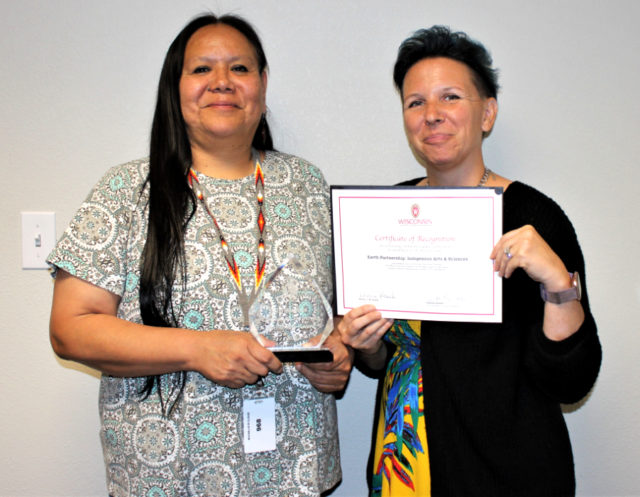
The University of Wisconsin-Madison recognized the Earth Partnership Indigenous Arts and Sciences (AIS) initiative with the Community-University Partnership Award on June 26. Indigenous Arts and Sciences is an initiative between UW-Madison and five tribal nations of Wisconsin, including the Ho-Chunk Nation.
The Department of Education, specifically the Culture and Community Education Division and School Community Relations Division, is in collaboration with UW-Madison and will be offering their 5th annual Goja Howaite Hi (Going on Continuously) youth environmental science camp the week of July 15 and recently held the 4th annual Teacher Institute centered on environmental science and Ho-Chunk culture.
Michelle Cloud, Division Manager of Culture and Community Education, and Bethany Redbird, Division Manager of School and Community Relations, represented the Ho-Chunk Nation at a private reception with UW-Madison Chancellor Rebecca Blank.
The goals of Indigenous Arts & Sciences include developing and strengthening capacity-building community partnerships with formal and informal educators that generate enthusiasm among youth and adults for environmental science learning and stewardship; Indigenize science learning by integrating science with Indigenous knowledge focusing on process, local protocols, connection to land, and cultural practices including learning from elders, a Native sense of identity, seasonal practices, Native language, storytelling, respect, relationships, responsibility, and reciprocity; and engage Native youth in Indigenous science learning experiences that motivate them to be engaged citizens through critical thinking and analysis of environmental issues and to explore STEM careers that meet future workforce needs to managing tribal resources.
The IAS initiative is funded through a National Science Foundation grant that is in its third and final year.
The initiative is the “intersectionality between Ho-Chunk culture and environmental science,” according to Michelle Cloud.
IAS honors and utilizes tribal elders as knowledge keepers of Ho-Chunk culture to make the connection between culture and land and water stewardship so educators and tribal youth will gain a greater understanding of Ho-Chunk people, traditions, and practices.
Hands-on activities that demonstrate viewing phenomena from multiple perspectives that allow educators to connect IAS curriculum to Common Core State Standards with an emphasis on critical thinking and problem solving are frequently utilized during the Teacher Institute.
Similarly, Goja Howaite Hi allows tribal youth to learn and understand how Ho-Chunk traditional practices are an integral part of science learning and, certainly, a large part of indigenizing science from the native perspective.
In essence, IAS allows both educators and youth to view science learning from an Indigenous perspective.
While IAS contribute to advances in educator capacity for culturally relevant instruction and in Native youth identity formation and engagement with environmental science, one of the main goals of the initiative is to generate enthusiasm among tribal youth to get them interested in pursuing environmental science careers.
The deep connection to the land and the protection of its resources is a long-held tradition among native people, especially the Ho-Chunk people. It is critically important for Ho-Chunk youth to understand the impact on our environment, cultural practices, and land and water stewardship by integrating native perspective to western science.
The Community-University Partnership Awards celebrates those who create innovative approaches to education, health, the arts, community service, business, scientific inquiry, and civic involvement. Nominations were open to UW-Madison faculty, staff and students, and their community partners as they address pressing public issues across the State of Wisconsin.
The Earth Partnership initiative is a collaboration between UW-Madison and five tribes, which include Bad River, Red Cliff, Lac Courte Oreilles, Lac du Flambeau, and the Ho-Chunk Nation. They bring together Native communities and the educators that serve them, around environmental science and stewardship.
Indigenous Arts & Sciences represents a growing transformation in university, tribal, community partnerships, where shared purpose, respect, and authentic relationships form the basis for equitable learning and environmental action.
Tribal community partners include Naomi Tillison, Stephanie Julian, Lori Lemieux, Dylan Jennings, and Joe Rose from Bad River; Chad Abel, Alex Breslov, Marvin Defoe, Frank Montano, and Reggie Cadotte from Red Cliff; Amber Marlow, Dennis White, Sue Menzel, and Mike Heim from Lac Courte Oreilles; Brian Gauthier, Larry Wawronowicz, Celeste Hockings, and Leon Valliere from Lac du Flambeau; and Michelle Cloud and Bethany Redbird from Ho-Chunk Nation.
UW-Madison Partners include Cheryl Bauer-Armstrong, Maria Moreno, Claire Bjork, and Rachel Byington from the Department of Planning and Landscape Architecture at UW-Madison in addition to Jessie Conaway from the Nelson Institute.
Other Nation internal partners include the divisions of Environmental Health and Cultural Resources, as well as the Department of Natural Resources.
The Community-University Partnership Awards celebrates those who create innovative approaches to education, health, the arts, community service, business, scientific inquiry, and civic involvement.


































